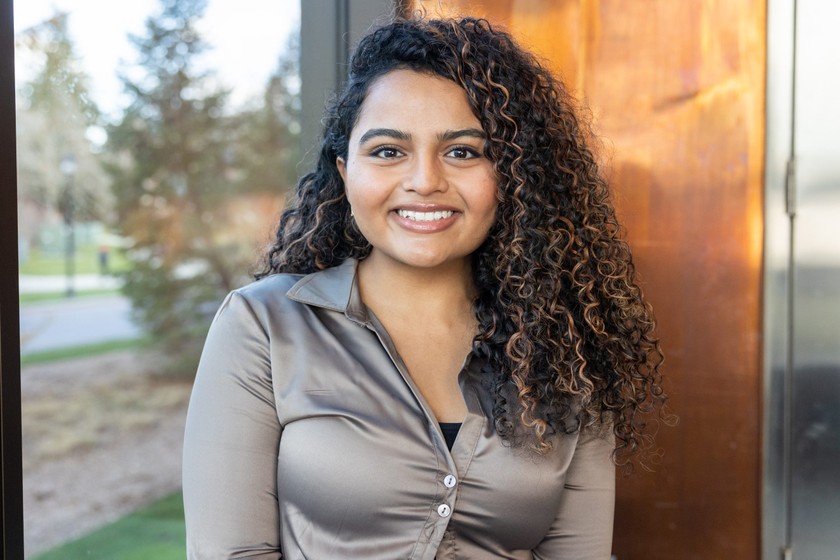
Nidhi Nair ’23 is a senior majoring in Economics at the UConn Storrs campus. After graduation, she will be participating in the eighth cohort of the Schwartzman Scholar Program as the first student from University of Connecticut. Nidhi has also started a Research Conference, called the Invisible Hand Speaker Series that focuses on minority students having access to researchers and mentors from across the world. Currently, she is conducting research on financial literacy for minoritized and underrepresented populations. Read to learn more about how Nidhi is advocating for first-generation students!
Alexis Staten: Can you tell me a little bit more about the Schwarzman Scholar Program you were admitted to?
Nidhi Nair: Sure. The Schwarzman Scholar Program is a really interesting, one of a kind opportunity. You are basically selected as part of a 150-person cohort out of 3,500 applicants from across the world, and all 150 people live in the same building at Shanghai University in Asia, which is the top University in Asia. You take courses together, you live together, and you eat together. It is kind of modeled off Rhodes College, and Oxford University. It is a very intensive cohort, and you spend one year getting a Master’s in Public Affairs. You learn a lot about leadership styles, and how to combine U.S and China perspectives as emerging leaders because both countries have tensions. The Schwarzman Scholars serve as an in-between to help facilitate more cooperation between both countries instead of differences.
AS: What do you plan on doing about the graduate fellowship; what is your future career goal?
NN: I think I want to do a Ph.D. in Economics, and that was my initial goal. When I enrolled in economics, I learned how math was important so I started studying math, and statistics. But, I’ve always liked Economics, and I want to get my Ph.D. in Economics someday.
AS: Who are the people that supported you with your success?
NN: My research mentor, Professor Bradley Wright! He is a sociology professor, and I joined his research team by accident my freshman year. He was studying Purpose and Well-Being, and I joined his lab because I thought it could be interesting. He has been such an incredible source of support. He has written me about 5,000 recommendation letters over the course of these four years. I owe everything to him.
AS: In your own research about financial literacy in students, is there any compelling data you have found?
NN: Less than 38% of UConn students are able to answer 3 basic questions of financial literacy correctly. That is a very poor number, but that is about the national average, which is 28% of undergraduate students in America. This is pretty bad considering that it is Connecticut, which is a wealthy state; we have access to a lot of resources, and we should be able to find more resources for financial literacy in undergraduate students.
If you are interested in participating in this study, please take the survey below. It will not take more than 5 minutes to complete!
Link to survey: https://uconn.co1.qualtrics.com/jfe/form/SV_5db32cTNTuLfAns
AS: Finally, what advice do you have for first-generation students?
NN: Start early! First-generation students have so many knowledge gaps about fundamental aspects of college. No one has told you how to find an advisor, or talk to professors after class. First-generation students don’t really know how to keep up different streams of income while in college. I think my biggest advice would be to start early, and to find a mentor early.
Also as a Resident Assistant, I advise many first-generation students, and I often tell them to get involved in research. You can either find out if you love or hate research, but at the same time, you’re also likely to find a mentor who is there to answer your questions. Your relationship would not be “professor” and “student”; it would be a little closer than that, so get involved in research early!
